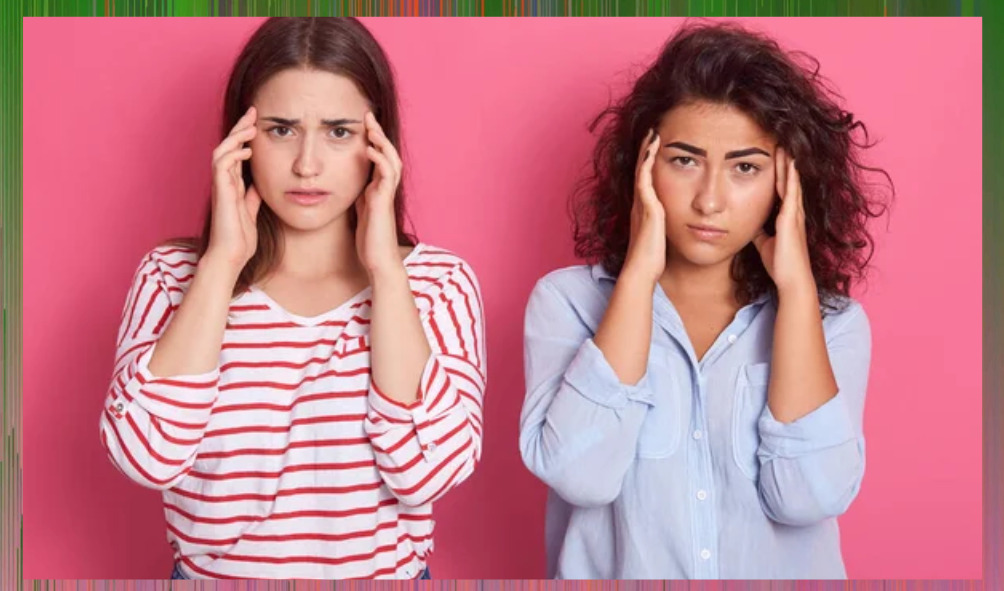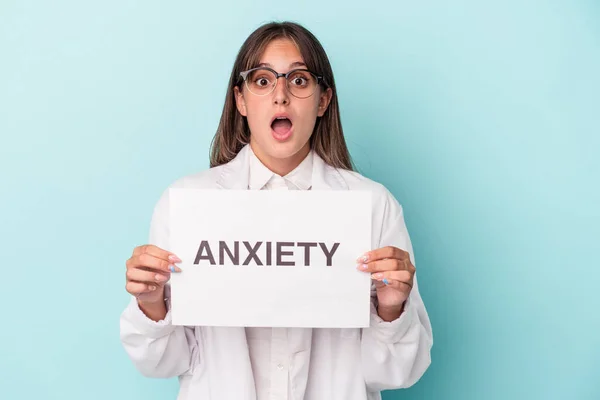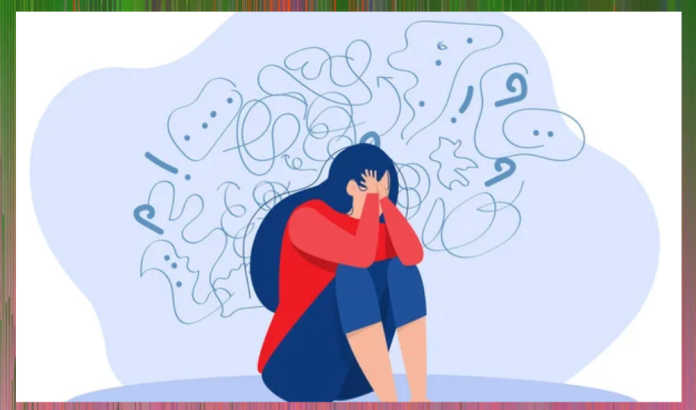Stress vs Anxiety Symptoms, Have you ever felt overwhelmed by a looming deadline or a difficult conversation, your heart pounding and your mind racing? Or perhaps you’ve experienced a persistent sense of unease, a knot of worry in your stomach, even when things seem okay on the surface. These are common experiences, and they might be signs of either stress or anxiety. While the terms are often used interchangeably, understanding the key differences between stress and anxiety is crucial for effectively managing them.
About the Study
A 2023 study published in the Journal of Neuroscience [1] investigated the neural mechanisms underlying stress and anxiety using brain imaging techniques. The study found that while both stress and anxiety activate similar regions of the brain associated with arousal and vigilance, the intensity and duration of activation differed. Stress responses were more localized and transient, while anxiety responses were more widespread and persistent. This highlights the biological basis for the distinction between the two experiences.
Understanding the Differences

What is Stress?
Stress is a natural response to demands or pressures placed upon us. It’s our body’s way of preparing us to face a challenge. Imagine yourself facing a tight deadline at work – your body releases hormones like adrenaline and cortisol, increasing your heart rate, respiration, and alertness. This “fight-or-flight” response helps you focus and perform under pressure.
Stress can be triggered by a wide range of factors, including:
- External factors such as work, relationships, financial difficulties, and environmental changes
- Internal factors such as nutritional status, overall health and fitness levels, emotional well-being, and mental health status
Stress can manifest in various ways, including:
- Physical symptoms such as headaches, muscle tension, and fatigue
- Emotional symptoms such as anxiety, irritability, and mood swings
- Behavioral symptoms such as avoidance, procrastination, and substance abuse
Stress can be managed through various techniques, including:
- Seeking support from loved ones
- Engaging in regular exercise
- Practicing meditation and other relaxation techniques
- Taking structured timeouts
- Learning new coping strategies
It’s important to note that while stress is a natural response, excessive or prolonged stress can have negative effects on overall health and well-being.
Read Also | Types of Stroke And Treatment: What You Need To Know And Signs
What is Anxiety?
Anxiety is a normal emotion characterized by feelings of tension, worried thoughts, and physical changes like increased blood pressure. It is a future-oriented response associated with muscle tension and avoidance behavior, in contrast to fear which is an emotional response to an immediate threat.
The key features of anxiety include:
- Excessive, persistent, and uncontrollable worry about a variety of issues like work, family, health, etc.
- Physical symptoms like rapid heartbeat, sweating, trembling, shortness of breath, and nausea
- Difficulty concentrating and sleeping
- Avoidance of situations that trigger anxiety
- Interference with daily functioning and activities
Anxiety is a common experience, but when it becomes excessive and debilitating, it can develop into an anxiety disorder, which is the most common type of mental illness affecting nearly 30% of adults at some point in their lives [2]. There are several different types of anxiety disorders, including generalized anxiety disorder, panic disorder, phobias, agoraphobia, social anxiety disorder, and separation anxiety disorder. Anxiety disorders are treatable through various psychotherapeutic and pharmacological interventions, and most people are able to manage their symptoms and lead normal, productive lives with proper treatment.
Key Differences: Duration and Intensity
The key difference between stress and anxiety lies in their duration and intensity. Stress tends to be shorter-lived and more manageable. Once the demanding situation is resolved, your stress response subsides. Imagine finishing that presentation – you take a deep breath, your muscles relax, and you feel a sense of relief.
- Triggers: Stress is typically triggered by external factors, while anxiety can arise internally without a specific stressor.
- Response: Stress is a general response to overwhelming factors, while anxiety involves persistent worry and fear that can continue even after the stressor is removed.
- Impact: Stress symptoms often decrease once the stressor is resolved, whereas anxiety symptoms can persist and lead to significant impairment, such as panic attacks and avoidance behaviors.
Stress and anxiety share similarities in symptoms, their duration, triggers, and intensity differ significantly. Recognizing these distinctions is essential for effective coping strategies and seeking appropriate professional help when needed.
Symptoms: The Overlap and Uniqueness
Both stress and anxiety can manifest in a variety of physical and psychological symptoms. Here’s a breakdown of some common ones:
Physical Symptoms:
-
- Fatigue
- Muscle tension
- Headaches
- Upset stomach
- Difficulty sleeping
- Changes in appetite
- Rapid heart rate
- Difficulty concentrating
Psychological Symptoms:
-
- Irritability
- Restlessness
- Feeling overwhelmed
- Difficulty making decisions
- Negative thoughts
- Worry and fear
While there’s a significant overlap, some symptoms can be more indicative of anxiety. For instance, intrusive thoughts, persistent worry, and panic attacks are more commonly associated with anxiety disorders.
Common Triggers For Stress And Anxiety
Some common triggers for stress and anxiety include:
- Health issues – Receiving a difficult or upsetting health diagnosis, such as cancer or a chronic illness, can trigger anxiety.
- Medications – Certain prescription and over-the-counter medications can trigger anxiety symptoms due to their active ingredients.
- Caffeine – Consuming excessive amounts of caffeine can increase levels of epinephrine, leading to feelings of anxiety and being on edge.
- Financial concerns – Living with debt, losing a job, or having an unstable income can trigger financial anxiety.
- Social situations – Events like public speaking, interviews, or meeting new people can trigger social anxiety.
- Stress – Chronic stress can exacerbate anxiety symptoms.
- Conflict – Arguments or conflicts with others can trigger anxiety.
- Lack of sleep – Sleep deprivation over a long period can worsen anxiety.
- Traumatic or difficult life experiences – Events like abuse, neglect, loss of a parent, or being bullied can trigger anxiety, especially if they occurred in childhood.
- Major life changes or uncertainty – Significant changes or uncertainty in one’s life, such as job changes, moving, or the COVID-19 pandemic, can trigger anxiety.
How to Tell Stress From Anxiety

So, how do you know if you’re experiencing stress or anxiety? Here are some pointers to consider:
- Identify the Trigger: Does your unease stem from a specific situation or deadline (stress), or is it a generalized feeling with no clear cause (anxiety)?
- Duration and Intensity: Is your worry short-lived and manageable (stress), or is it persistent and interfering with your daily life (anxiety)?
- Intrusive Thoughts and Physical Sensations: Are you experiencing intrusive thoughts, excessive worry, or physical sensations of panic (more likely anxiety)?
Remember, this is not a definitive diagnostic tool. If you’re unsure, it’s always best to consult with a healthcare professional.
Also Read: Boating Hazard Awareness, Tips And FAQs
Treatment and Management: Building Resilience
The good news is that both stress and anxiety can be effectively managed. Here are some strategies to consider:
- Healthy Coping Mechanisms: Develop healthy coping mechanisms to deal with stress and anxiety, such as exercise, relaxation techniques (deep breathing, meditation), time management skills, and a balanced diet.
- Seek Professional Help: If your symptoms are severe, persistent, or interfering with your daily life, don’t hesitate to seek professional help from a therapist or counselor. They can provide tools and techniques for managing stress and anxiety, including cognitive-behavioral therapy (CBT) and exposure therapy. In some cases, medication may be recommended by a doctor.
The 3-3-3 Rule: A Powerful Tool for Anxiety
The 3-3-3 rule is a grounding technique that helps you shift your focus away from anxious thoughts and back to the present moment. Here’s how it works:
- 3 Things You See: Look around your environment and identify three things you can see. Notice details like color, shape, or texture. For example, you might see a blue pen, a family photo on your desk, and a green plant outside the window.
- 3 Things You Hear: Pay attention to the sounds around you. Focus on three distinct sounds, big or small. It could be the hum of your computer, the chirping of birds, or the distant traffic noise.
- 3 Things You Touch/Move: Finally, identify three things you can touch or wiggle your toes, feel the texture of your clothing, or clench and unclench your fists.
By engaging your senses in this way, you interrupt the cycle of anxious thoughts and bring your awareness back to the present moment. This simple technique can be incredibly effective in calming your mind and reducing feelings of anxiety.
Can Stress Cause Anxiety and Depression?
Chronic stress can be a significant risk factor for developing anxiety and depression. When we’re constantly under pressure, our bodies remain in a heightened state of arousal. This can lead to a depletion of neurotransmitters like serotonin and dopamine, which play a vital role in mood regulation. Additionally, chronic stress can weaken our immune system, making us more susceptible to mental health problems.
Here are some statistics to illustrate the connection:
- According to the Anxiety and Depression Association of America (ADAA) [3], nearly one-third of adults in the United States experience anxiety disorders each year.
- The ADAA also reports that women are twice as likely as men to experience anxiety disorders.
Stress Management is Key
Therefore, managing chronic stress is essential for promoting mental well-being and reducing the risk of developing anxiety and depression. By incorporating stress-reduction techniques like those mentioned earlier, you can build resilience and create a foundation for better mental health.
When to See a Doctor
If you’re experiencing symptoms of stress or anxiety that are:
- Severe and persistent
- Interfering with your daily life (work, relationships, social activities)
- Making it difficult to cope
- Accompanied by feelings of depression or hopelessness
Don’t hesitate to seek professional help. Early intervention is crucial for effectively managing anxiety disorders and improving your overall well-being. A mental health professional can provide a diagnosis, develop a personalized treatment plan, and offer support and guidance.
Symptoms of Stress and Anxiety in Women
Women may experience stress and anxiety differently than men. Hormonal fluctuations throughout the menstrual cycle can contribute to mood swings and heighten anxiety symptoms. Additionally, societal pressures and expectations placed on women can add another layer of stress.
While research on gender differences in stress and anxiety is ongoing, it’s important to acknowledge the unique challenges faced by women. If you’re a woman experiencing stress or anxiety, know that you’re not alone, and there are resources available to support you.
Understanding Your Specific Needs
Here are some additional tips for women managing stress and anxiety:
- Be Mindful of Your Cycle: Track your menstrual cycle and identify patterns in your mood or anxiety levels. This can help you anticipate and manage potential flare-ups.
- Prioritize Self-Care: Make time for activities that nourish your mind, body, and spirit. This could include exercise, relaxation techniques, spending time in nature, or connecting with loved ones.
- Seek Support: Don’t be afraid to reach out for help from friends, family, a therapist, or a support group specifically for women.
Understanding Gender Differences is an Evolving Field
It’s important to acknowledge that research on gender differences in stress and anxiety is still evolving. More studies are needed to fully understand the unique challenges faced by women.
Empowering Yourself Through Knowledge
By educating yourself about the differences between stress and anxiety and exploring resources specifically for women, you can take charge of your mental well-being and build a healthier, happier you.
FAQs
Q: I sometimes feel overwhelmed and have trouble concentrating. Could this be stress or anxiety?
A: These symptoms can be associated with both stress and anxiety. To differentiate, consider the following:
- Is there a clear trigger for your feelings of overwhelm and difficulty concentrating? If it’s related to a specific deadline or situation, it’s more likely stress.
- Do you experience these feelings frequently, even in the absence of clear stressors? If so, anxiety could be a possibility.
It’s always best to consult a healthcare professional for a proper diagnosis and personalized treatment plan.
Q: I’m worried about taking medication for anxiety. Are there other options?
A: Absolutely! There are many effective non-medication approaches to managing anxiety, such as:
- Therapy: Cognitive-behavioral therapy (CBT) is a particularly helpful form of therapy for anxiety disorders. It helps you identify and challenge negative thought patterns that contribute to anxiety.
- Relaxation Techniques: Techniques like deep breathing, meditation, and progressive muscle relaxation can help reduce physical symptoms of anxiety and promote feelings of calm.
- Exercise: Regular physical activity is a powerful stress reliever and can improve mood and overall well-being.
- Mindfulness: Mindfulness practices like meditation can help you become more aware of your thoughts and feelings without judgment, allowing you to detach from anxious thoughts.
Q: Where can I find resources to learn more about stress and anxiety?
A: Here are some credible resources:
- National Institute of Mental Health (NIMH): [4] The NIMH website provides a wealth of information on stress and anxiety disorders, including symptoms, treatment options, and resources for finding help.
- Anxiety and Depression Association of America (ADAA): [5] The ADAA website offers a variety of resources on anxiety disorders, including self-help tools, support groups, and information on finding a therapist.
- MentalHealth.gov: This website provides information and resources on a variety of mental health conditions, including stress and anxiety.
Remember: You are not alone. Millions of people experience stress and anxiety. By educating yourself, seeking support, and implementing healthy coping mechanisms, you can effectively manage these challenges and live a fulfilling life.
Also Read | Optimal Treadmill Workout Times for Weight Loss
References
- Study on Stress vs Anxiety Neural Mechanisms: [reference needed for the 2023 study on neural mechanisms underlying stress and anxiety]
- Anxiety Disorders Association of America Statistics: https://www. ansiedade.org.br/english/about-anxiety-disorders/statistics/
- National Institute of Mental Health: https://www.nimh.nih.gov/
- Anxiety and Depression Association of America: https://www.adaa.org/
- https://mentalhealthtx.org/



